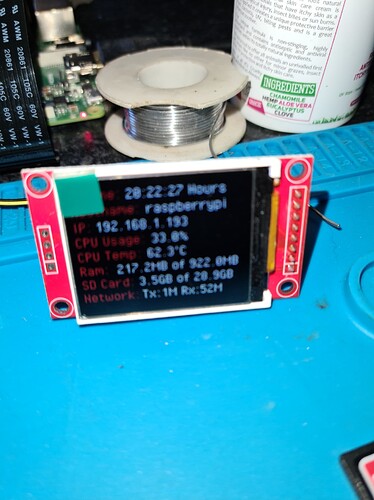Hi,
Sorry for the late reply.
Your suggestion works, after I installed python3-dev I was able to install the luma.lcd library.
But had to run the command:
sudo -H pipx install luma.lcd --include-deps
And as soon as I run:
sudo python3 /home/server/LCD-Stats/examples/stats.py --config /home/server/LCD-Stats/conf/st7735mod.conf
It outputs the following error: > Traceback (most recent call last):
File “/home/server/LCD-Stats/examples/stats.py”, line 7, in
import psutil
ModuleNotFoundError: No module named ‘psutil’
When I run:
sudo -H pip install psutil
It outputs the following error: > error: externally-managed-environment
× This environment is externally managed
╰─> To install Python packages system-wide, try apt install
python3-xyz, where xyz is the package you are trying to
install.
If you wish to install a non-Debian-packaged Python package,
create a virtual environment using python3 -m venv path/to/venv.
Then use path/to/venv/bin/python and path/to/venv/bin/pip. Make
sure you have python3-full installed.
If you wish to install a non-Debian packaged Python application,
it may be easiest to use pipx install xyz, which will manage a
virtual environment for you. Make sure you have pipx installed.
See /usr/share/doc/python3.11/README.venv for more information.
note: If you believe this is a mistake, please contact your Python installation or OS distribution provider. You can override this, at the risk of breaking your Python installation or OS, by passing --break-system-packages.
hint: See PEP 668 for the detailed specification.
And when I run:
sudo -H pipx install psutil
It outputs the following error:
No apps associated with package psutil or its dependencies. If you are attempting to install a library, pipx should not be used. Consider using pip or a similar tool instead.
I also tried:
sudo -H pipx install psutils
And it outputs the following error: > Fatal error from pip prevented installation. Full pip output in file:
/root/.local/pipx/logs/cmd_2023-07-07_18.03.16_pip_errors.log
Some possibly relevant errors from pip install:
ERROR: Could not find a version that satisfies the requirement psutils (from versions: none)
ERROR: No matching distribution found for psutils
I think I’m tired of beating a dead horse, Debian 12 gave me nothing but problems, I use Debian 12 as a desktop OS and had and still have some problems installing Lutris and games on it.
